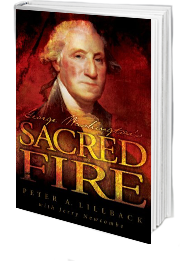Providence Today – “A Model of Christian Charity”
In 1630, hundreds of Puritans sailed to America to go on to create the city of Boston. This was the first major wave of Puritans coming to the New World. Plymouth in 1620 created by the Pilgrims, who were separatists, created a toehold in the New World in what would become New England. The Pilgrims were a small subset of the Puritans. The Puritans worked for the purity of the Church of England, while remaining within it. The Pilgrims were separatists, saying that it was a hopeless task. Later persecution in England (especially under King Charles I) got so bad, that many Puritans left.
In 1630, the leader of the Puritans, Rev. John Winthrop, preached a sermon, “A Model of Christian Charity,” in which he quoted Jesus, using the phrase “a city upon a hill.” That became a metaphor for their colony and later for what America could be. Here is a Providence Today segment about the early settlement of the Puritans.
Jerry Newcombe:
In the last century or two, tens of millions of people have aspired to come to America. That is, the United States of America. People from around the world, continue to try and reach these shores. In some cases they’ll even risk their lives to do so. What is the ultimate source of this unparalleled freedom?
Jerry Newcombe:
The answer can be found more than a hundred years before the Founding Fathers sat down to declare liberty in 1776.
Narrator:
On April 7th, 1630, a fleet of ships carrying about 1000 British men, women and children began a three month voyage to the new world. They would soon arrive in what is now Boston, Massachusetts, the city they created, they were the Puritans. Their leader was the Reverend John Winthrop, whom noted historian, Paul Johnson, has dubbed ‘the first great American’. Aboard the ship Arabella, Winthrop preached a sermon to his followers called a model of Christian charity. His voice carried so that those in all of the ships could hear him.
Narrator:
” We shall find that the God of Israel is among us and 10 of us shall be able to resist a thousand of our enemies. The Lord will make our name, praise and glory so that men shall say of succeeding plantations. The Lord, make it like that of new England for, we must consider that we shall be like a city upon a hill. The eyes of all people are on us”, John Winthrop.
Narrator:
The city upon a hill reference of Reverend John Winthrop -who is quoting Jesus- was a favorite phrase of Ronald Reagan. In 1989 in his last radio address outgoing president Ronald Reagan referenced it.
Ronald Reagan:
“The hope of human freedom, the quest for it, the achievement of it is the American saga. And I’ve often recalled one group of early settlers making a treacherous crossing of the Atlantic on a small ship. When their leader, a minister noted that perhaps their venture would fail and they would become a by word, a footnote to history, but perhaps too, with God’s help, they might also found a new world, a city upon a hill, a light under the nations.”
Marshall Foster :
The Puritans are often maligned today. They’re thrown into… “Put A’s on women’s chest” and the Witch hunts of Salem in the 1680s and 90s, these sidelights of history should be put in context. These Puritans, the vast majority of them, not only were they biblical thinkers, they were open-minded and developed a form of government that allowed Liberty and justice for all. If you believe in America’s constitution and in the freedoms we have today, you can look no further than the Puritans.
Narrator:
The Puritans gained their moniker because they had attempted to work for the purity of the church of England. A tiny subset of Puritans were the Separatists who thought reform within the church was hopeless.
Narrator:
The most famous of these separatists were the Pilgrims, a particular congregation who founded a colony in Plymouth, Massachusetts, thus Plymouth in 1620 paved the way to New England, beginning in earnest in 1630. Although the Puritans had planned to stay in England and continue to work for the church’s reform, persecution in England grew exceedingly bitter for them.
William J. Federer:
What happened was that, if you didn’t believe exactly the way the king did, you were persecuted and there would be burning at the stake. There would be drawn and quartering. It was a pretty serious thing.
William J. Federer:
Sometimes in England, in the Star Chamber, they would brand them on the face as a heretic with the letters SL for seditious libel, or cut off an ear, or even cut someone’s nose in half. It was serious for not believing the way the king did. And so for conscience’ sake, that’s when people began to flee and eventually fled to the colonies in America.
Jerry Newcombe:
The Puritans shown the light of the Bible on various aspects of civilization, including Government, Law and Education. They played a critical role in laying the foundation of American Liberty, a role that is often overlooked today.
Jerry Newcombe:
Pilgrim expert, Paul Jehle observes that Americans today, “like the fruit of our Liberty, but not necessarily the root of that Liberty, which is our Judeo-Christian heritage. But it was that root that produced the fruit”.
Jerry Newcombe:
For Providence Forum, I’m Jerry Newcombe.
